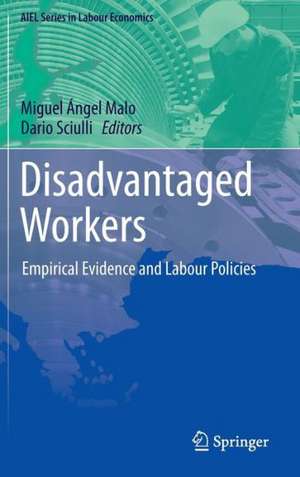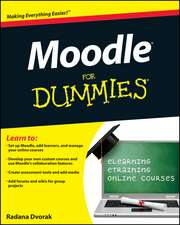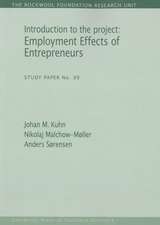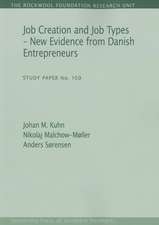Disadvantaged Workers: Empirical Evidence and Labour Policies: AIEL Series in Labour Economics
Editat de Miguel Ángel Malo, Dario Sciullien Limba Engleză Hardback – 7 apr 2014
| Toate formatele și edițiile | Preț | Express |
|---|---|---|
| Paperback (1) | 563.66 lei 38-44 zile | |
| Springer International Publishing – 24 sep 2016 | 563.66 lei 38-44 zile | |
| Hardback (1) | 648.56 lei 22-36 zile | |
| Springer International Publishing – 7 apr 2014 | 648.56 lei 22-36 zile |
Preț: 648.56 lei
Preț vechi: 763.01 lei
-15% Nou
Puncte Express: 973
Preț estimativ în valută:
124.10€ • 129.92$ • 102.69£
124.10€ • 129.92$ • 102.69£
Carte disponibilă
Livrare economică 17-31 martie
Preluare comenzi: 021 569.72.76
Specificații
ISBN-13: 9783319043753
ISBN-10: 3319043757
Pagini: 320
Ilustrații: XII, 320 p. 29 illus.
Dimensiuni: 155 x 235 x 25 mm
Greutate: 0.64 kg
Ediția:2014
Editura: Springer International Publishing
Colecția Springer
Seria AIEL Series in Labour Economics
Locul publicării:Cham, Switzerland
ISBN-10: 3319043757
Pagini: 320
Ilustrații: XII, 320 p. 29 illus.
Dimensiuni: 155 x 235 x 25 mm
Greutate: 0.64 kg
Ediția:2014
Editura: Springer International Publishing
Colecția Springer
Seria AIEL Series in Labour Economics
Locul publicării:Cham, Switzerland
Public țintă
ResearchCuprins
Part I Disabled people in the labour market.- Part II Young workers in the labour market.- Part III Women, migrants and long-term unemployed.
Notă biografică
Miguel Á. Malo is an Associate Professor of Economics at the University of Salamanca (Spain). He has been a visiting scholar at UMIST (University of Manchester Institute of Science and Technology, UK), European Centre for Analysis in the Social Sciences (University of Essex, UK), National Bureau for Economic Research (USA) and the International Labour Organization (Switzerland). His main research interests are employment policies, labour market segmentation, employment protection legislation and employment of people with disabilities. From 2000 to 2002, he was the Spanish expert about employment of people with disabilities in the corresponding international network created by the European Commission. In 2007, he provided expert advice to the Spanish Ministry of Employment to design a new strategy to promote the employment for people with disabilities. During 2013, he has been on leave working as a Senior Economist at the International Labour Organization.
Dario Sciulli (Ph.D. Tor Vergata University, Rome 2006) is assistant professor of economic policy at the Department of Economic Studies, University of Chieti-Pescara, Italy. He has held visiting positions at the Universidad Carlos III Madrid (Spain), University of York (UK) and VU University Amsterdam (the Netherlands). He has held post-doc positions at the University of the Azores (Portugal) and University of Chieti-Pescara (Italy). His research interests include labour economics, child development and later outcomes, economics of disability and policy evaluation. He is a member of the executive committee of AIEL (the Italian Association of Labour Economists).
Dario Sciulli (Ph.D. Tor Vergata University, Rome 2006) is assistant professor of economic policy at the Department of Economic Studies, University of Chieti-Pescara, Italy. He has held visiting positions at the Universidad Carlos III Madrid (Spain), University of York (UK) and VU University Amsterdam (the Netherlands). He has held post-doc positions at the University of the Azores (Portugal) and University of Chieti-Pescara (Italy). His research interests include labour economics, child development and later outcomes, economics of disability and policy evaluation. He is a member of the executive committee of AIEL (the Italian Association of Labour Economists).
Textul de pe ultima copertă
This book includes empirical contributions focusing on disadvantaged workers. According to the European Commission’s definition, disadvantaged workers include categories of workers with difficulties entering the labour market without assistance and, hence, requiring the application of public measures aimed at improving their employment opportunities. In addition to the labour market perspective, this is also relevant in terms of social cohesion, which is one of the central objectives of the European Union and of its Member States. This work deals with the most relevant groups of disadvantaged workers, namely disabled workers, young workers, women living in depressed areas, migrants in the labour market and the long-term unemployed, and analyses the situation in the Italian, Spanish and some African labour markets. The determinants of disadvantage in the labour market are investigated, highlighting both the role of supply variables, including structural factors, and the weakness on the demand side, the role of the economic crisis, and the ineffectiveness of some labour policies. A complex framework emerges in which disadvantaged groups may share common problems, both in terms of integration into the labour market and in terms of working conditions, but often require group-specific policies, taking into account their intergroup heterogeneity.
Caracteristici
Provides empirical evidence focusing on recent labour market data Special emphasis on the recent EU definition of social exclusion Helps policy makers in designing policies for disadvantaged workers Includes intriguing results on the impact of the current economic crisis on the labour market for disadvantaged workers





















